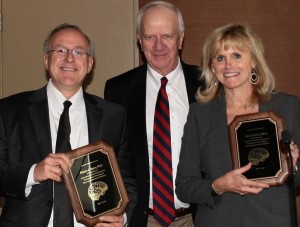Department of Neurology Hosts Second Annual Carlos S. Kase Research Symposium
The Department of Neurology’s commitment to research may be seen both in the activities of the faculty and in the faculty’s dedication to engaging residents and students in research opportunities. These efforts were highlighted on Tuesday, May 17 at the second annual Carlos S. Kase Research Symposium.
The event, organized by Drs. Anna Hohler and Rafael Zuzuarregui, brought together faculty, residents, students, and alumni for a showcase of posters and lectures highlighting research on movement disorders, stroke, traumatic brain injury, neurodegenerative diseases, sleep disorders, and other areas.
“The BU Neurology Research Symposium is a wonderful yearly event in which all the faculty can get together and appreciate the great work that our basic scientists, clinical trainees, and faculty have generated throughout the preceding year,” said Department of Neurology Chair Dr. Carlos Kase.
The Kase Symposium grew out of CORTEX, a mentoring program co-directed by Hohler and Zuzuarregui that pairs residents and medical students with department faculty on research and quality improvement initiatives.
“The purpose of CORTEX is to foster a sense of collaboration, to educate residents and students about research, and to provide medical students with early exposure to neurology and clinical research,” said Zuzuarregui.
The symposium highlighted current research efforts through a poster session and live presentations. Dr. Viken Babikian, professor of Neurology and co-director of the Stroke Service at Boston Medical Center, gave an overview of stroke research being conducted at BU, including studies on the use of portable sleep studies to evaluate stroke patients for sleep disorders and stroke intervention studies.
“Boston University was early to this game,” said Babikian. “We began studying acute interventions very early on.”
Dr. Andrew Budson, professor of Neurology and associate director of Research for the Alzheimer’s Disease Center, spoke about memory research. He described studies that explored the use of pictures and music to improve memory and research into the relationship between mindfulness and memory.
A study conceived of by research assistant Nicholas Simmons-Stearn explored the use of musical mnemonics to improve memory in patients with Alzheimer’s Disease (AD). The study, which used obscure songs to compare memory of spoken lyrics versus sung lyrics, found that patients with mild AD were better able to remember lyrics that were sung than words that were spoken.
“This paper made a splash when it came out,” said Budson.
Additional presentations by senior residents highlighted research in the areas of lumbar puncture simulation, stroke education and management, and racial disparities in Parkinson’s disease. Dr. Julie Grimes received the resident award for research for her work on sleep apnea and stroke.
“Golden Brain” awards for medical student teaching excellence were given to resident Panagiotis Kassavetis and attending Dr. Jan Kucera.
 (l to r) Drs. Stern, Kase, McKee
(l to r) Drs. Stern, Kase, McKee
Drs. Ann McKee and Robert Stern, whose work on CTE and AD has garnered international recognition, received awards for research excellence.
“Drs. McKee and Stern have steadily contributed to the department’s research enterprise over the years, through their work in the NIH-funded Alzheimer’s Disease Center, where they have both played an essential role in generating a number of clinical and pathology studies, in training and mentoring young scientists, and in contributing to the education of medical students, residents, and fellows.”
Kase described major contributions McKee and Stern have made to the field of Chronic Traumatic Encephalopathy research, noting that their seminal observations of its clinical features and pathology have essentially re-defined it as a clinico-pathologic entity.
“Their work on CTE has put BU and the department of Neurology at BMC in the forefront of research of an entity that has major implications as a neurodegenerative disease model, as a subject for pathological and biochemical research, and as a potentially major public health problem,“ said Kase.
Both McKee and Stern praised Kase for creating an environment that supports research and researchers. Kase, who will retire this summer, received a standing ovation from the crowd of more than 80 attendees.
“We look forward to using this annual symposium to continue his legacy of research and collaboration,” said Hohler.
Submitted by Monica Parker-James
View all posts